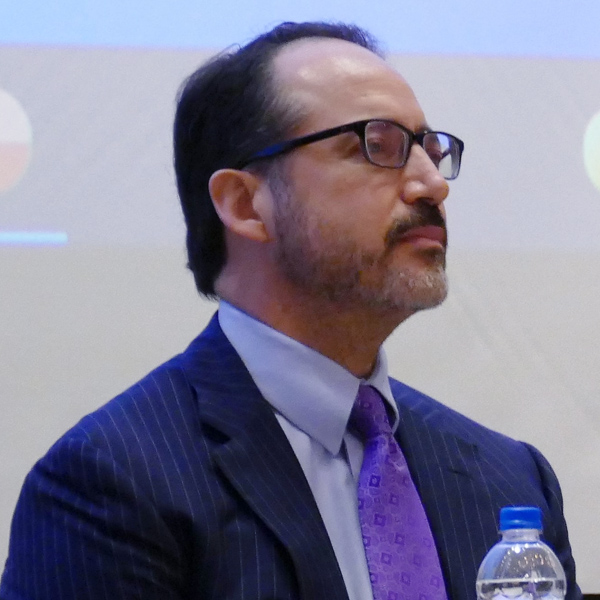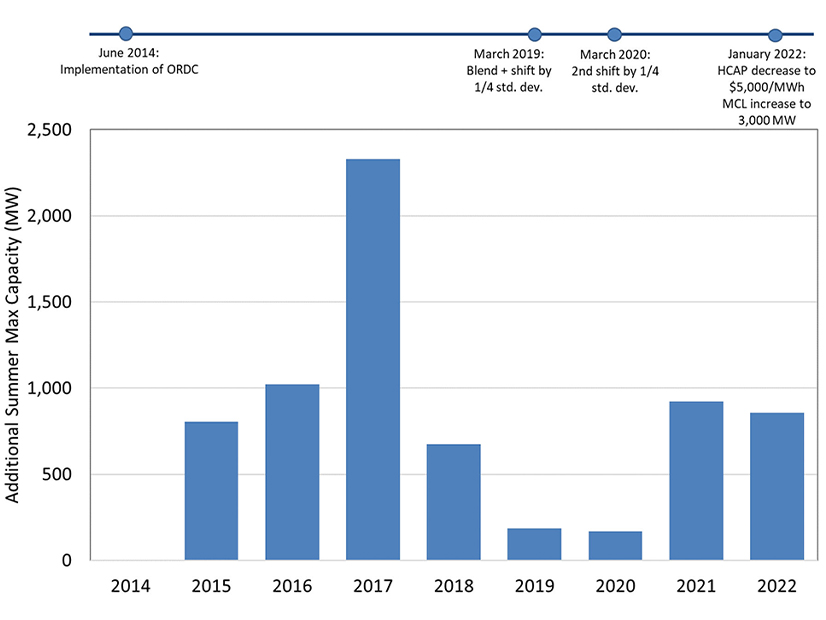
ERCOT’s Independent Market Monitor continues to criticize Texas regulators’ preferred market redesign, saying the proposal is a “less effective and efficient means” to manage the market’s generation fleet.
During a hearing before the state Senate’s Business and Commerce Committee Feb. 7, Potomac Economics’ Carrie Bivens said the IMM does not support the performance credit mechanism (PCM) that the Public Utility Commission agreed to last month. (See Texas PUC Submits Reliability Plan to Legislature.)
The PCM rewards generators in ERCOT’s energy-only market with credits based on their performance during a determined number of scarcity hours. Those credits must either be bought by load-serving entities or exchanged between them and generators in a voluntary forward market.
Bivens said the IMM believes that recent modifications to the ISO’s operating reserve demand curve after the deadly 2021 winter storm provide “more than sufficient price signals” to retain market resources. She told lawmakers the PCM is a “novel concept” that will likely result in unintended consequences because of its design “challenges.”
“Our evaluation of the concept is that it decreases the efficiency of the energy market,” Bivens said. “In our opinion, if it’s designed appropriately, the most likely result is that performance credits will clear at zero and not add any benefits, since we’re already meeting the reliability standard. Otherwise, it may disrupt and distort the market leading to inefficient outcomes at increased costs.”
 Sen. Jose Menendez | © RTO Insider LLC
Sen. Jose Menendez | © RTO Insider LLCSen. Jose Menendez (D) asked Bivens who would bear the costs of implementing the market mechanism. Energy and Environmental Economics (E3), a consulting firm hired last year by the PUC to review various proposed market revisions, put the implementation cost at $460 million.
“It shifts the risks from generators on to the load, and so it most benefits generators,” said Bivens, who has said the $460 million would be a minimum estimate for incremental costs.
She said the IMM has not performed its own analysis of the PCM’s costs, saying there are still several outstanding factors that “frustrate the ability” to derive an accurate cost estimate.
“Most particular is how the demand curve is going to be formulated. That is going to be a huge contributor to how much these items are going to cost,” Bivens said. “The reason I say that’s the minimum is because a model such as E3’s is going to assume perfect decisions, perfect capacity, no overbuild, no underbuild, no market-power abuse. You know, perfect information by all the participants, and that doesn’t exist in the real world.”
E3 has said the credits could cost retailers $5.7 billion a year, but that could be “significantly” offset by an overall decrease in energy costs.
Bivens agreed with Menendez that it is inaccurate to say no new thermal generation has recently been built, as Sen. Robert Nichols (R) said during an opening history lesson on ERCOT’s market development.
“We’re continuing to lose dispatchable power,” Nichols said. “No one is building anything new.”
The IMM noted in comments to the PUC that since 2014 the market has added about 7 GW of thermal generation — all natural gas, just the fuel type lawmakers asked for with legislation after the winter storm.
Asked by Menendez about the possibility of self-dealing among the so-called gentailers (companies with both generation and retail affiliates), Bivens said the IMM will work with the PUC to address market-power concerns, should the credit mechanism move forward.
Price manipulation is a concern “in every market, such as this one, in which there’s a concentration of supply,” she said.
Bivens was part of a three-person panel that also included PUC Chair Peter Lake and E3’s Zach Ming. Lake and Ming spent much of their time defending the PCM as Bivens sat silently for more than four hours.
“I’ve been very impressed with just your steadfastness,” Sen. Phil King (R) told her.
Senators questioned Lake and Ming on how the PUC’s proposal would incent the dispatchable generation they and other lawmakers requested during the 2021 legislative session. As the committee’s own press release put it, the PCM “was met with skepticism by members.”
“This is the first of its kind. We’ve seen the first of its kind before. Sometimes it works; sometimes it doesn’t,” Sen. Lois Kolkhorst (R) said. “We cannot miss on this. It’s critical.”
“If this PCM plan is adopted, will these new plants ever come online?” Sen. Brian Birdwell (R) asked Lake.
“We know market forces work,” Lake responded.
 ERCOT has added about 7GW of dispatchable generation, all gas, since 2014. | Potomac Economics
ERCOT has added about 7GW of dispatchable generation, all gas, since 2014. | Potomac Economics
Asked whether the PUC could promise more reliability, Lake said, “Our goal was to provide you all the broad definition of the best reliability service that we could identify as a result of our analysis, and we recognize that there are a lot of technical questions yet to be answered.”
Lake told the committee he would put further planning on hold while they think things over.
As the hearing ended, an anonymous market participant who goes by the Twitter handle “King of Power,” tweeted that the “least bad option politically” would be for Texas to subsidize loans to new gas generators. That would be just fine with Lt. Gov. Dan Patrick, who presides over the Senate. On Monday, Patrick listed “adding new natural gas plants” as one of his top priorities for the session; he has threatened special sessions if he doesn’t get his way.
The tweet continued: “Lt. Gov and company get new gas plants, PCM is killed, [energy-only] market is intact, and senators can say they leveled playing field vs [environmental, social, and governance investing].”
Sen. King conducted the hearing after the committee’s chair, Sen. Charles Schwertner (R), spent the previous night in the Travis County Jail after being arrested for driving while intoxicated.
“The chair, as you know, is not going to be able to be with us today,” King said as he opened the hearing.
In a statement, Patrick said he will wait on the final outcome of Schwertner’s legal case before making a further statement. However, some have speculated this could cost the senator his chairmanship. Schwertner has been a vocal critic of the PCM, calling it a “costly and complex proposal that is unlikely to deliver the dispatchable generation resources that Texas needs.”
It’s not the first time Schwertner has found himself in hot water. He was investigated in 2018 for sending sexually-explicit text messages to a University of Texas graduate student. The inquiry ended when it determined that it was “plausible” that a third party had sent the messages.



